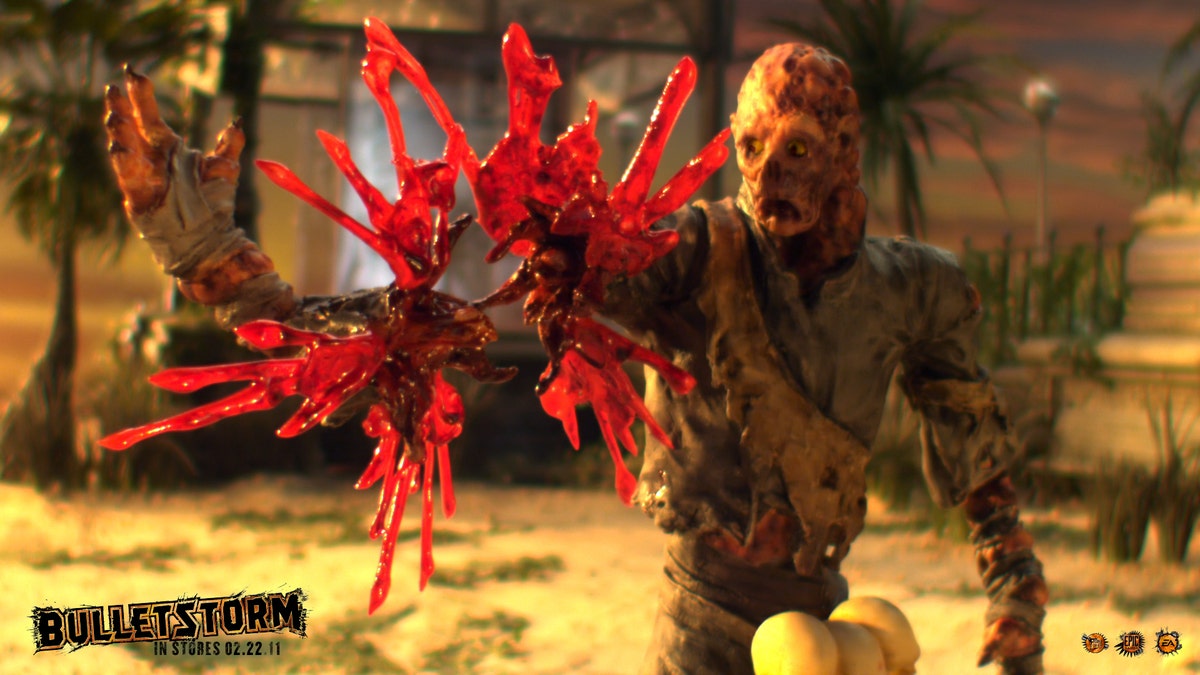
An artist's recreation of a scene from controversial video game Bulletstorm, which takes violence, vulgar language and sexual innuendos to a new level. (Epic)
Parents had better beware: There's a Bulletstorm on the horizon.
In the new video game Bulletstorm due February 22, players are rewarded for shooting enemies in the private parts (such as the buttocks). There’s an excess of profanity, of course, including frequent use of F-words. And Bulletstorm is particularly gruesome, with body parts that explode all over the screen.
But that's not the worst part.
The in-game awards system, called Skill Shots, ties the ugly, graphic violence into explicit sex acts: "topless" means cutting a player in half, while a "gang bang" means killing multiple enemies. And with kids as young as 9 playing such games, the experts FoxNews.com spoke with were nearly universally worried that video game violence may be reaching a fever pitch.
“If a younger kid experiences Bulletstorm's explicit language and violence, the damage could be significant,” Dr. Jerry Weichman, a clinical psychologist at the Hoag Neurosciences Institute in Southern California, told FoxNews.com.
“Violent video games like Bulletstorm have the potential to send the message that violence and insults with sexual innuendos are the way to handle disputes and problems,” Weichman said.
Carole Lieberman, a psychiatrist and book author, told FoxNews.com that sexual situations and acts in video games -- highlighted so well in Bulletstorm -- have led to real-world sexual violence.
“The increase in rapes can be attributed in large part to the playing out of [sexual] scenes in video games,” she said.
The Entertainment Software Rating Board (ESRB), rates all video games as a guide for parents; each game carries a letter-label at retail (T for Teen, M for Mature) and an online-only summary. Lieberman and others say it's useless, because it isn't enforced at retail.
Video game advocates say the existing warning system works fine: Parents are responsible for deciding whether their kids can play games, not the government. Epic, the game developer, did not respond to FoxNews.com's requests. But game publisher Electronic Arts released the following statement: "Bulletstorm has been given an "M" rating by the ESRB, and we have adhered to all their guidelines in regards to the marketing and promotion of Bulletstorm."
More important, defenders argue that games with excessive violence and sexual content simply don't sell well.
“Games without sufficient quality of gameplay -- games that include highly objectionable violent or sexual content -- often pump up the level of this kind of content to gain media attention. This tactic typically fails, as can be seen in the poor sales performance of titles such as BMX XXX and Postal,” said Billy Pidgeon, a video game analyst with M2 Research.
The most common response is that, in the U.S., game makers have the right to produce violent content. If the government restricts games they would have to further restrict all media.
Penalizing store clerks
There might be a simple way to address the problem: penalties for selling violent games to kids.
This year, the Supreme Court will make a landmark decision about video-game violence. A California law now makes it illegal for a merchant to sell a Mature-rated game to a minor; the law imposes a $1,000 fine. But the Entertainment Software Association (ESA) has sued to overturn the law.
“Between a great ratings system, parental controls on the consoles and the major retailers inhibiting the
sale of Mature-rated games to minors, the matter is really one for parents and adults to consider, individually,” Hal Halpin, the president of the similar Entertainment Consumers Association, told FoxNews.com. “I respect the creative rights of game developers to make a game like Bulletstorm in the same way that I appreciate Quentin Tarantino's right to make over-the-top movies like Kill Bill."
Melanie Killen, Ph.D., a professor at the University of Maryland who has pushed for laws that govern the sale of video games, disagrees that the ESRB rating system is working. She says 9-year-olds are playing games like Bulletstorm and that there is no real enforcement. The FCC monitors all TV broadcasts and stiffly fines broadcasters for violating decency rules, yet there are no penalties in place for retailers who sell violent games to kids.
“The marketing is clearly aimed at children and young adolescents,” Killen said. “Politicians were organizing efforts to address violent video games prior to the presidential election but got distracted by the election. It is time for senators and representatives to come back to the issue.”
Are the warnings enough?
To be fair, the online-only ESRB warning for Bulletstorm does spell out the objectionable content -- and even that is too graphic to reproduce entirely. Here's an excerpt:
Video game publishers traditionally stay glib about the issue of violence. Microsoft, maker of the Xbox 360 console, declined to comment. Epic Games did not respond to requests, and the developer did not respond. Remi Sklar, the vice president of Public Relations at Warner Brothers Interactive Entertainment, which makes numerous video games (though is unconnected to Bulletstorm), offered the following statement: “We don’t have a comment for that story.”
In the end, those who don’t see a problem with Bulletstorm praise the game for being innovative.
“One thing that tends to be ignored is that if Bulletstorm consisted solely of beating people up, it wouldn't be fun to play,” said Hal Levy with the National Youth Rights Association.
“It's been praised for encouraging innovative thinking. Bulletstorm involves developing new moves and dispatching of enemies creatively. Plenty of emotionally unstable adults will play the game and they’ll be fine,” he said.




















